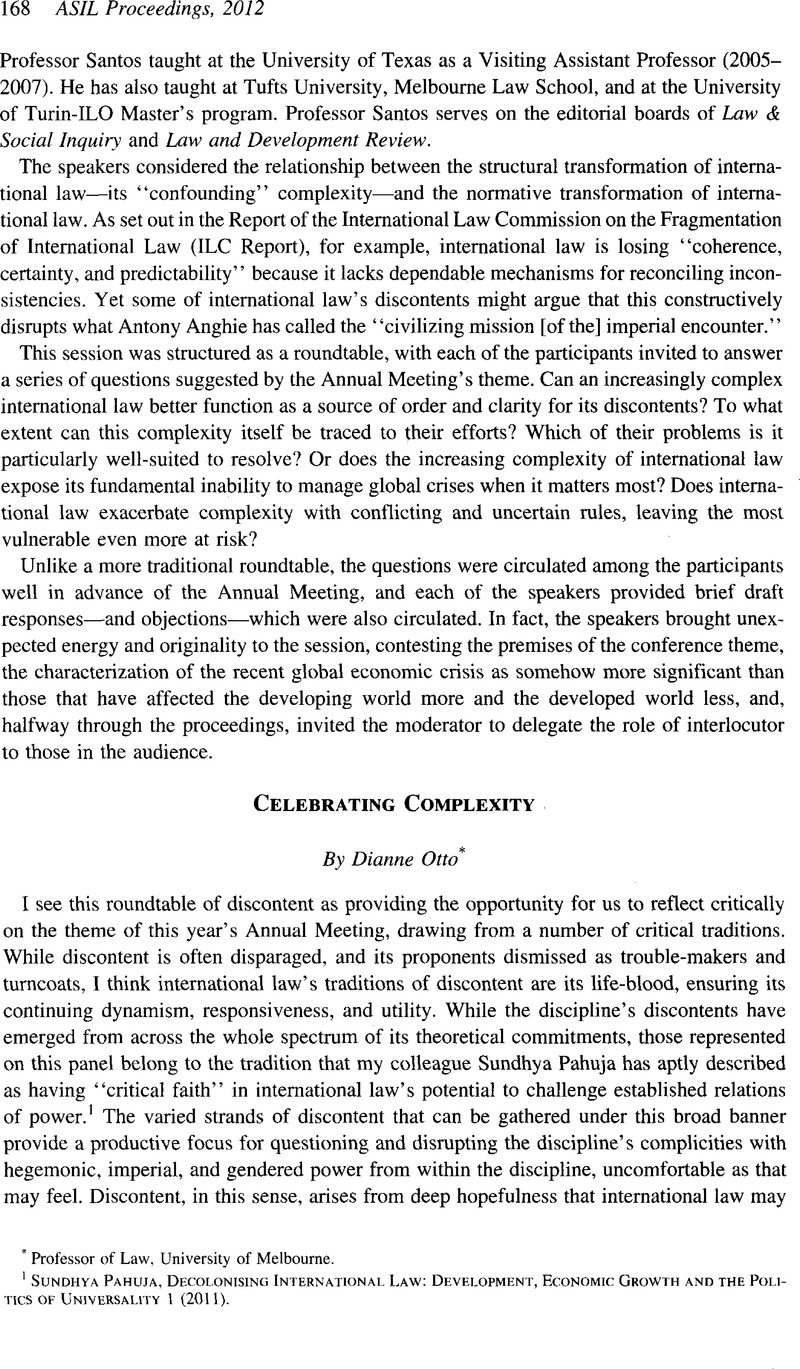No CrossRef data available.
Article contents
Celebrating Complexity
Published online by Cambridge University Press: 28 February 2017
Abstract

- Type
- International Law and its Discontents: The Normative Implications, and Strategic Opportunities, of Complexity
- Information
- Copyright
- Copyright © American Society of International Law 2012
References
1 Pahuja, Sundhya, Decolonising International Law: Development, Economic Growth and the Politics of Universality 1 (2011)Google Scholar.
2 Butler, Judith, Precarious Life: the Powers of Mourning and Violence 20 (2004)Google Scholar.
3 See Otto, Dianne, International Human Rights Law: The Perils of Sex/Gender Dualism and Asymmetry, in A Research Companion to Feminist Legal Theory (Davies, Margaret & Munro, Vanessa eds., forthcoming 2012)Google Scholar.
4 Otto, Dianne, Power and Danger: Feminist Engagement with International Law Through the UN Security Council, 32 Australian Feminist L.J. 97–121 (2010)CrossRefGoogle Scholar.
5 Charlesworth, Hilary, International Law: A Crisis of Discipline, 65 Mod. L. Rev. 377 (2002)CrossRefGoogle Scholar.
6 Report of the Special Rapporteur on the Promotion and Protection of Human Rights and Fundamental Freedoms While Countering Terrorism, UN Doc. A/64/211, § III (Aug. 3, 2009).
7 Human Rights Council Res. 6/28, para. 2(c) (Dec. 14, 2007).
8 The Special Rapporteur cites the UNHCR Guidelines on International Protection No. 1: Gender-Related Persecution Within the Context of Article 1A(2) of the 1951 Convention and/or its 1967 Protocol Relating to the Status of Refugees, UN Doc. HCR/GIP/02/01 (May 7, 2002); CEDAW General Recommendation No. 25, UN Doc. A/59/38 (Supp.), Annex 1 ; CESCR General Comment No. 20, UN Doc. E/C. 12/GC/20, para. 32; and the Yogyakarta Principles on the Application of International Human Rights Law in Relation to Sexual Orientation and Gender Identity (2007), available at http://www.yogyakartaprinciples.org/.
9 Report of the Special Rapporteur, supra note 6, para. 20. See also summary and para. 52 (conclusions).
10 Id. para. 20.
11 Id. paras. 18, 23, 31, 38.
12 Id. paras. 23, 27.
13 Id. paras. 36, 48, 27.
14 Id. paras. 37, 44.
15 DPI, GA/SHC/3959, 64th General Assembly, Third Committee, 28th and 29th meetings (Oct. 16, 2009).
16 Koskenniemi, Martti, Hegemonic Regimes, in Regime Interaction in International Law: Facing Fragmentation 305-24 (Young, Margaret A. ed., 2012)Google Scholar.




